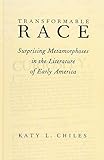Transformable Race: Surprising Metamorphoses in the Literature of Early America.
Material type: TextPublication details: Oxford : Oxford Scholarship Online, [2014]Description: 1 online resourceContent type:
TextPublication details: Oxford : Oxford Scholarship Online, [2014]Description: 1 online resourceContent type: - text
- computer
- online resource
- 0199313504
- 9780199313501
- 0199313512
- 9780199313518
- 0199350728
- 9780199350728
- 9781306082013
- 1306082013
- American literature -- 18th century -- History and criticism
- Race in literature
- Race awareness in literature
- Race relations in literature
- Human skin color in literature
- Black people -- Race identity -- United States -- History -- 18th century
- Indians of North America -- Ethnic identity -- History -- 18th century
- White people -- Race identity -- United States -- History -- 18th century
- Littérature américaine -- 18e siècle -- Histoire et critique
- Race dans la littérature
- Conscience de race dans la littérature
- Relations raciales dans la littérature
- Couleur de la peau dans la littérature
- American literature
- Black people -- Race identity
- Human skin color in literature
- Indians of North America -- Ethnic identity
- Race awareness in literature
- Race in literature
- Race relations in literature
- White people -- Race identity
- United States
- 1700-1799
- 810.9 23
- PS195.R32
| Item type | Home library | Collection | Call number | Materials specified | Status | Date due | Barcode | |
|---|---|---|---|---|---|---|---|---|
 Electronic-Books
Electronic-Books
|
OPJGU Sonepat- Campus | E-Books EBSCO | Available |
Print version record.
Introduction: surprising metamorphoses -- Becoming colored in Occom and Wheatley's early America -- To make Samson Occom "so" -- "To make a poet black" -- The political bodies of Benjamin Franklin and Hendrick Aupaumut -- You are what you eat; or, Franklin's practice makes (almost) perfect -- Hendrick Aupaumut's own color -- Transforming into natives: Crèvecoeur, Marrant, and Brown on becoming Indian -- Passing as, transforming into Crèvecoeur's American race -- John Marrant becoming Cherokee -- Edgar Huntly's unsettling transformation -- Doubting transformable race: -- Equiano, Brackenridge, and the textuality of natural history -- To quote and to question: Olaudah Equiano's provocative ends -- Brackenridge and the limits of writing natural history -- Epilogue: interiorizing racial metamorphosis: -- The Algerine captive's language of sympathy.
Racial thought at the close of the 18th century differed radically from that of the 19th century, when the concept of race as a fixed biological category would emerge. Instead, many early Americans thought that race was an exterior bodily trait, incrementally produced by environmental factors, and continuously subject to change. While historians have documented aspects of 18th century racial thought, this is the first book to identify how this thinking informs the figurative language in the literature of this crucial period.
eBooks on EBSCOhost EBSCO eBook Subscription Academic Collection - Worldwide
There are no comments on this title.

